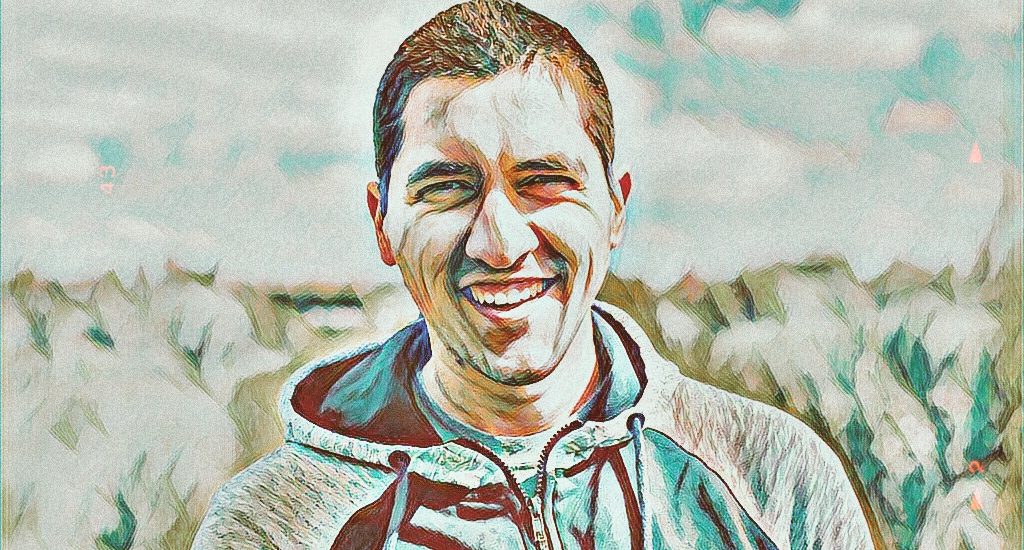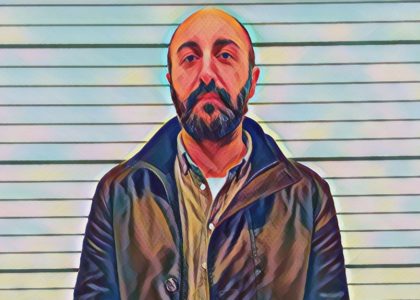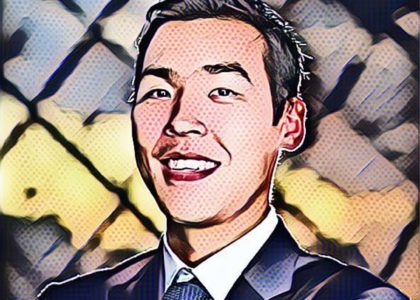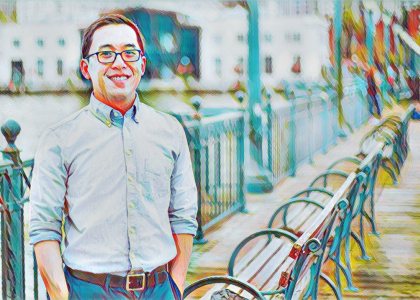Meet Valentin, he is founder and the brains behind the Thankbox.
Thankbox is an online group card and cash collection service. It’s a digital way for lots of lovely people to celebrate one lucky person. It’s super simple – you set up a Thankbox for someone, then share a link to everyone who you want to contribute to it and when you are done we email it to the recipient. Everyone can optionally leave cash for the recipient as well, which pools together and can be claimed as a gift card for the recipient. It’s a really simple business model with a one-off charge for every Thankbox bought.
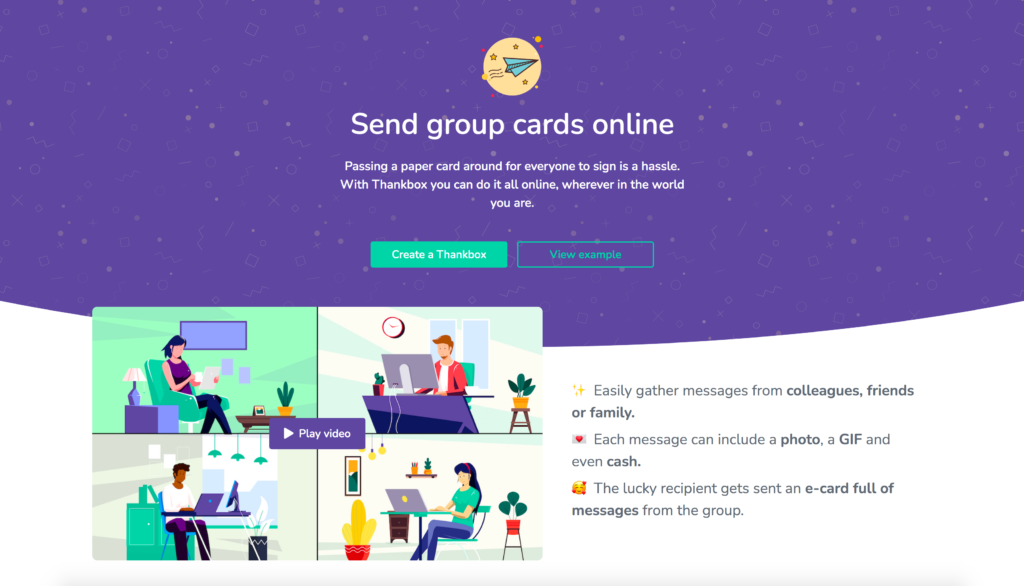
How did you come up with your product idea? Was there another person or a situation in your life that made you want to create it?
I live in the UK where there is a big office occasion celebration culture. I’ve been a part of many different teams and each of them would celebrate things like someone leaving, someone’s birthday or work anniversary by getting a paper card and everyone signing it. There might also be an envelope where people leave cash for a gift. The end result was nice and the recipient was always happy but the whole process was always a hassle. The card would usually be bought last-minute by the person’s manager. Then he’d have to chase people around the office to (discretely) sign it. Some people that weren’t physically present in the office couldn’t contribute at all. If there was an envelope cash collection, people would have to run to the ATM to get cash to leave in there because who uses physical cash anymore, right? This was all pre-Covid19.
During another one of these occasions, I thought to myself “there must be a better way to do this, online”. I did some research and found that there was really nothing that covered both aspects of this – both the message and cash collection. That’s when a lightbulb turned on – “this is something I can do!”. I started brainstorming early designs on what would eventually become Thankbox in November 2019. I had just started planning out a landing page but then I paused for a bit, as I had too much on my plate at the time – full time contracting (which I still do) and joining another startup as a technical advisor.
Then March 2020 happened. Everyone was going to work remote. I was meditating one morning ( I try and do it every day for at least 10 minutes) and all of a sudden this thought pattern hit me like a train: “This is the perfect time to do Thankbox”. “If there ever was a time to do it, it’s now”. “Nobody can do the paper card thing anymore; companies will need a way to do this”. It totally ruined my meditation 😅 but it stuck in my mind like a worm. The first version of Thankbox went live 2 months later in May.
How is your product different or unique?
Like I mentioned above, there are already products out there that do just the group card. But none of them combines this with the cash collection. I can understand why – it’s a bit of an accounting and legal nightmare. I almost gave up a few times because of it. But I managed to get good advice and figure it out.
I feel Thankbox has really captured “simplicity” as a core feature. “It needs to be as simple to use as buying and signing a paper card, if not simpler” – that phrase has been my north star since the beginning. It’s incredibly hard not to overburden a product with features and to distil it to just the ones it needs so people “get it” without complex tutorials or explainer popups. While we can always improve on this front, I feel we have executed very well. This can be seen by the testimonials people leave us. “Simple”, “Friendly”, “easy to use” are words that are always present there.
Is this your first entrepreneurial venture?
This is my second real startup but the first one that has made money. My first try was a social media app for sharing your favorite content (podcasts, books, etc.) – it was called Curated. We had some initial success with it, getting featured on the Google Playstore and we got some good press in tech publications like Tech Radar. The problem was the scope was too large for just me and my cofounder to build and it also had no plan to reach monetization. We ended up burning a lot of cash to learn an expensive lesson.
Without it, though, I would’ve never decided to learn more about startups, been introduced to communities such as IndieHackers and to the litany of entrepreneurship podcasts and books that I have consumed since then. It’s also while building Curated that I met my current designer, Barbara, and Joe, a really good web developer. Both are currently part of Thankbox.
Was there anything in your past (childhood, young adulthood) that made you a better entrepreneur?
I believe my parents had a huge impact on me wanting to do something on my own. My mum and dad were one of the first entrepreneurs in post-socialist Bulgaria. They set up a really successful IT distribution business in the 90s which is now one of the best in its sector in the country. I watched them work hard and succeed, often in a very inhospitable business environment. I feel a lot of that work ethic and grit has rubbed off on me.
I wasn’t really “entrepreneurial” in my childhood, though. I feel like the seeds of that appeared after I did my first app and I saw it gain traction. It was called Bargain Bytes and I released it in 2015, just after graduating university. It’s a simple free app for tracking when PC games are on sale in places like Steam, etc.… I posted it in a few places and it quickly got to 20k+ downloads. I was blown away that people were using something I built. It’s still live and being used, even though the last updated I did on it was in 2018.
Tell me a bit about your past as you see relevant (where are you from, where did you go to school?)
I’m from a small town called Veliko Tarnovo in Bulgaria. I was lucky to be born in 1991, just as the country was transitioning away from socialism. I graduated high school a few years after Bulgaria joined the EU – a move which opened a lot of doors to my generation. I was accepted to study computer game programming at the University of Abertay Dundee in Scotland in 2010 and I got my student fees covered by the Scottish government because I was an EU student.
I’ve since stayed in Scotland – I briefly worked as a game programmer, which was tons of fun. Then quickly moved on to being a mobile app developer as there was an increasing shortage, and therefore increasing pay, for that skillset at the time. For the last 4 or 5 years, I’ve been working as a native iOS & Android contractor for different companies – helping their teams out for a 6- or 12-month period at a time.
Tell me a bit about you. (Hobbies, favorite entertainment, favorite vacation spots)
Right now I would vacation anywhere other than my house, haha. You’d probably not be surprised that most of my free time is eaten up by working on Thankbox. After that my priority is to spend time with my family – I’ve got a 3-year-old daughter who always has a place for me during playtime 😁.
I am a gamer at heart and I am planning on upgrading my PC soon in order to play a bit of Cyberpunk over the Christmas holidays.
When the pandemic is over I am eager to resume my Tang Soo Do training – it’s a Korean martial art I’ve been doing for 4 years and I’m a couple of belts away from a black belt. I used to go twice a week and it’s a great way to both release stress and regain focus.
When did you decide to become an entrepreneur? What were the circumstances in your life at the time?
I’ve covered some of this above, but in addition, I’d say that it’s definitely not a single event that took me down that path. Rather, it’s a series of many events over my life that took me down a road where entrepreneurship just “made sense” as a thing I would do.
Tell me a bit about your company or team (do you have any other people working with in team or you working all by yourself?)
I have 4 team members who all work part-time on Thankbox and help me with various tasks. I pay all of them on a daily rate basis if they do any tasks in each month. They’re also all people I can turn to for advice and an opinion when building Thankbox. It’s important for me to have them as people I can bounce ideas off of.
- Joe is the guy that taught me how to build a website and backend. He agreed on a profit-sharing arrangement for Thankbox in order to help me build the first versions of it. Since that point, I still turn to him for coding advice as he has a lot of knowledge on the Thankbox tech stack.
- Barbara is my designer – she’s the reason the product looks as nice as it does. She spends a couple of days a month doing design-related tasks for it.
- Alex is my marketing guy – he helps me out with social campaigns, managing ads and working on the product copy. He spends about a day a week on Thankbox. He tends to look at ideas and problems from a different angle than I do, and this has been very beneficial. It means that we can have discussions during which the correct way to do things tends to naturally emerge.
- Nikolay is a university computer science student I recently hired to help me get more work done on Thankbox as more of my time is eaten up by my contracting work. He’s been really good at picking up some of the coding tasks I just cannot get to.
Did you invest any money in your business? Were there others that funded it?
Yes, I see myself as my own VC – I’ve fully bootstrapped it and I don’t plan to raise any money for it anytime soon. Thankbox is still not entirely paying for itself but I see it getting there in 2021. When I started, my wife, who is a lot better at finance than I am, helped me set up a spreadsheet to plan my incomings and outgoings. I knew how much money I had coming in from my contract work, I knew how much of that I needed to take home, we both knew how our savings were and to what extent we can rely on them. That allowed me to decide on an amount I could comfortably dedicate to Thankbox every month and have been sticking to it ever since.
I was really lucky that when I brought the product idea to Joe, he agreed to spend a few months on it in exchange for a profit-sharing arrangement. Basically, once Thankbox starts hitting certain revenue milestones, Joe will get a percentage of the profits for a set period of time. Without his agreement to do this I would’ve never been able to get it out there as quickly as it did. It also effectively de-risked this venture for me as it removed a lot of the upfront cost. And I plan to make it a profitable choice for Joe as well.
What helps you to stay on your path and follow your goal during a tough time?
Honestly, seeing people using my product. It still boggles my mind sometimes that people are paying money for something I’ve built. Also, the fact that the product itself is one that has kindness and happiness at its core. People have been using Thankbox to celebrate weddings, new babies, farewells, retirements, and birthdays.
My mum and I organized a birthday Thankbox for my wife’s 30th birthday this September. So many people added messages to it, including some friends from Bulgaria she hadn’t seen in ages. Looking at her scrolling through it on her phone, with tears of happiness in her eyes just made me think “Yep, this is something special and I am proud to have built it”.
What were the best decisions you made when you were starting your business?
Doing some financial planning and business modelling at the start. Those things tend to worry me and that helped alleviate some of the stress and “de-risk” the venture a bit in my mind.
Keeping the product as simple and lean as it can be. I learned that lesson from my first startup. Thankbox was an MVP in every literal sense of the word when it launched. Almost all the features I’ve added since then I’ve done because of user requests and actions. I don’t have time to work on features that will never be used. There’s a phrase in programming called YAGNI (you aren’t going to need it). It is used when a programmer pre-emptively adds some functionality even though it’s not necessary at the time “just in case” it might be later. I try to apply that to my product features as well as my coding.
What were the worst decisions you made when you were starting your business?
I can’t really think of a single worse one but one I make constantly is being too reactive – to bugs, to user feedback and to problems in general. These things inevitably happen, more often as you scale, and my first reaction is always “Oh god, I need to fix it now”. But often, I don’t. The fact that that one user doesn’t think a button shouldn’t be there doesn’t mean you should immediately remove it. I’ve been learning to be less reactive and to take a step back, especially when something feels “urgent”. I try to think it through so that any “fix” I do has been thought out and appropriate, not rushed. Regular meditation helps with this as it allows me to catch myself falling into that thinking trap quicker.
What advice have you found indispensable in running your business?
Talk to the users of the product!. Honestly, do it. I forced myself to do it in the beginning and it has never stopped paying dividends. A lot of my early users were people I knew since they found out about Thankbox from me posting on Twitter or LinkedIn. I got as much feedback from them as I could. They really helped me polish and craft Thankbox into the experience it is now.
When you are talking to the users, It’s always good to follow up with more clarifying questions.
Share your success and hardships with people who love and support you. When you’re a solo founder this is vital. For me, this person has been my wife. She is my biggest fan and has been sharing my joy and sorrows since the beginning of Thankbox. Her support in this has been invaluable to me – she can both motivate me when I’m feeling down and ground me when I start losing my way.
Going forward, what are your plans for this product or for other entrepreneurial pursuits?
October and November have been great months for Thankbox. After numerous iterations on our landing page, I feel like we’re in on a good place with our positioning and brand voice. This got compounded by finally finding a good acquisition channel – search ads. These have driven increasing growth that still hasn’t quite settled.
My plans for the end of 2020 are to “mature” the business side of the product a bit. For example, my KPI tracking so far was added in an ad-hoc manner. I have worked to revise what exactly I want to measure and now I need to implement it. Late summer and fall saw a lot of new features getting added that I now want to spend some time revising and polishing up.
Afterwards, in 2021 I am planning to work on and launch what will be the next major milestone for Thankbox – subscription plans for businesses. I already have some companies that use Thankbox several times a month and I want to create monthly plans that let them have a set number (or unlimited) Thankboxes they can use every month. I believe this is what will really push Thankbox into its next phase as it means there’ll be reliable recurring revenue coming in, rather than unpredictable one-off payments.
What advice do you have for entrepreneurs who just starting their journey?
Accept the fact that you’ll learn a lot of lessons the hard way. You can read all the advice in the world, but you’ll inevitably make mistakes that others have made before, even if you were warned about them. A lot of the advice I was given makes sense in retrospect after you’ve made a lot of the core mistakes. Don’t be let down by that – it’s part of the process.
The process can and should be fun – you are totally allowed to have fun making a startup even if it doesn’t turn out to be “successful”. In fact, I wrote this on our Basecamp discussion board a mere 2 weeks after we started working on Thankbox properly:
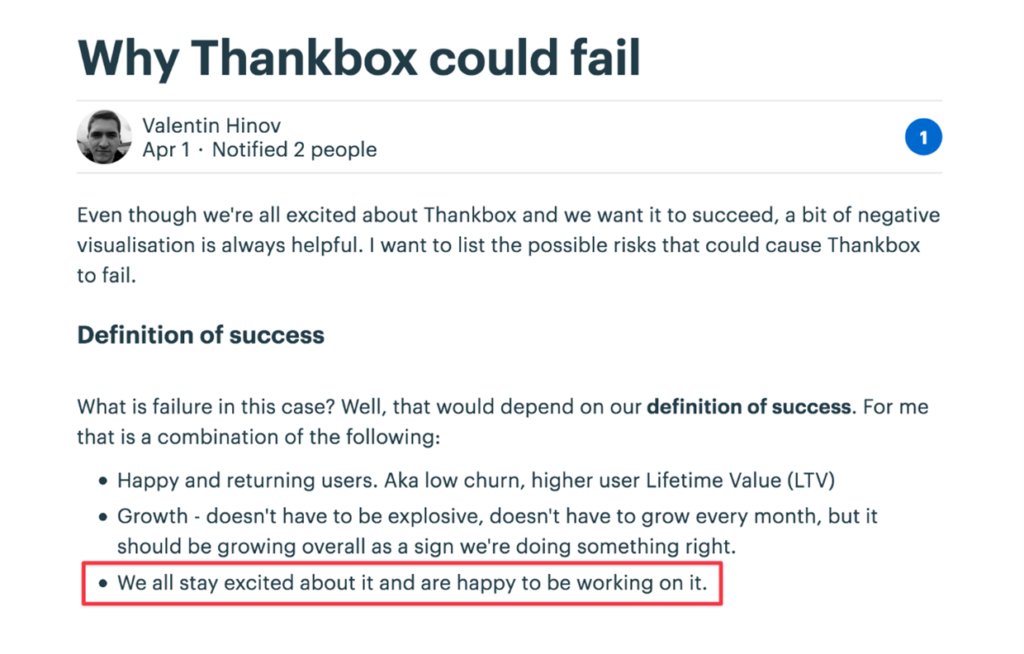
As you can see, Valentin is a fascinating entrepreneur with a great outlook on life. His product Thankbox is innovative and yet so simple in design. I really believe that he is bringing something great into the world, especially in a world that has reduced contact with our friends, families, and coworkers. Valentin’s final thought on entrepreneurship is simple but poignant. I feel like it can be applied to all areas of our lives.
If you’re not having fun, then what are you doing?

